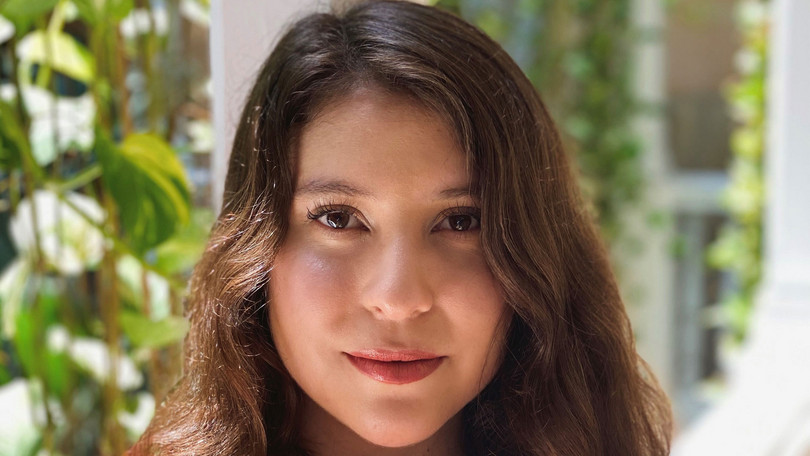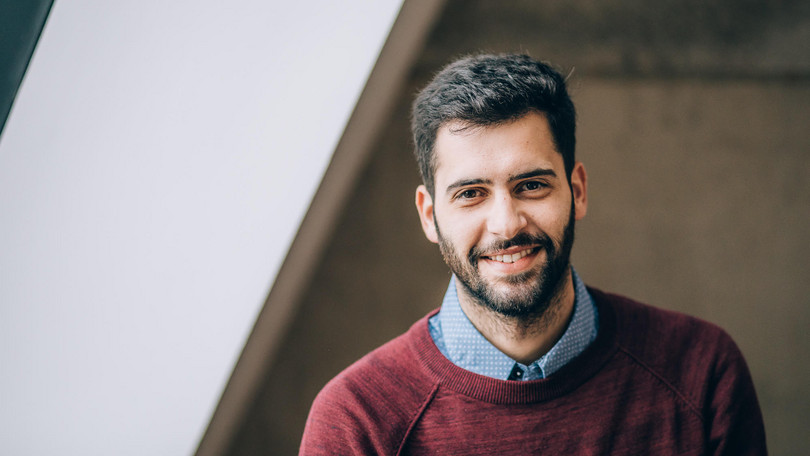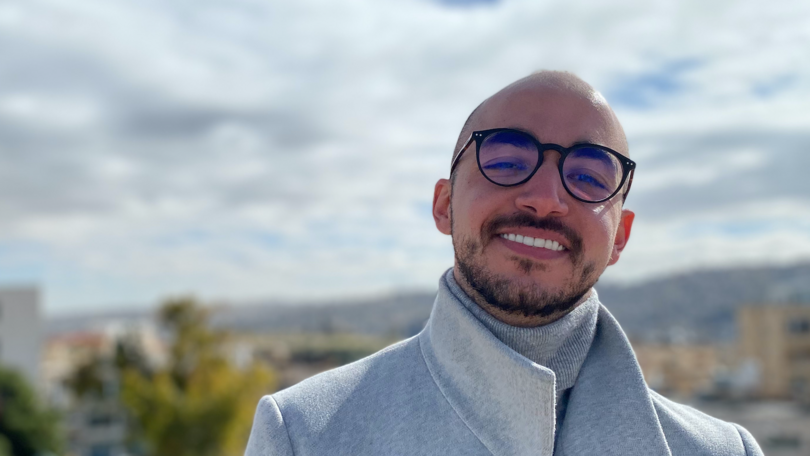Master Arts and Cultural Management: Erfahrungsberichte
Warum entscheiden sich Kulturschaffende aus aller Welt für den Master Arts and Cultural Management? Was sind ihre Erfahrungen aus dem berufsbegleitenden Masterstudium an der Leuphana Professional School? Erfahren Sie hier mehr in den Erfahrungsberichten unserer Studierenden und Alumni.
- Akshay Seebaluck: Skizzenbuch im Gepäck (Startseitenartikel)
- Montserrat Ros: An opportunity to further my educational qualifications
- Bradley Ransom: From Michigan to Germany (Podcast)
- Johnny Kort: My confidence in dealing with cultural realities in the local context has increased
- Ali Khair: Macuma opened new doors for my career
- Katherine Annlise Román Aquino: An important overview of the variability of scenarios where a cultural manager can be at
Podcast "How to study in Germany"
Bradley Ransom wurde nach Abschluss seines Studiums Associate Director of Employer Relations bei The Washington Center, Washington D.C., USA.
An opportunity to further my educational qualifications without having to make undesirable compromises
 ©privat
©privat
Montserrat Ros studierte die 60-CP-Variante des Master Arts and Cultural Management. Die Kolumbianerin lebt und arbeitet in Hamburg.
I found out about the Master of Arts and Cultural Management (MACUMA) at Leuphana University of Lüneburg while browsing through potential master programmes with focus on the arts and cultural sector. I initiated that search with rather small hopes of finding a programme that didn’t involve a major life adjustment such as potentially having to quit my job or having to relocate or both - at least temporarily. The first would have been very inconvenient and the second quite uncomfortable taking into consideration that due to different life circumstances, I moved six times (out of which four were to a different country) within the three years prior to my settlement in Hamburg, Germany. I’m most grateful to the MACUMA programme of the Professional School because it offered me the opportunity to further my educational qualifications without having to make undesirable compromises.
Whereas combining full-time work with the studies has proven to be a great challenge, it has nevertheless taught me a new level of time-management and organisational skills, which have demonstrated to be extremely useful in life outside the academic sphere. Studying mostly online provides the necessary flexibility to incorporate the studies into one’s daily routine and the user-friendly online platform of the Professional School is key to this endeavour. I would advise others thinking of studying while working, especially when the workload is the toughest, to not lose sight of the benefits and the goal one is pursuing, as in the end, it is my opinion that the advantages surpass the difficulties of juggling work, studies and life while having less free time at night.
Another important advantage from this programme has been the networking possibilities with my fellow students from all over the world, many of whom I now consider as friends and with whom I will surely meet again (once we agree on a country and time zone) in the future.
A further appealing factor about this Masters programme is that it comprises a carefully curated spectrum of subjects in management, cultural sustainability, marketing and research methods, as well as key supporting electives that both expand and complement the learning process and that very well connect with my academic background in international business, my work in international cooperation and my interest in culture and cultural studies.
My confidence in dealing with cultural realities has increased
 ©Copyright (c) 1998 Hewlett-Packard Company
©Copyright (c) 1998 Hewlett-Packard Company
Johnny Kort schloss den Master Arts and Cultural Management 2021 ab. Er arbeitet als Kulturmanager in Ramallah.
Why did you decide to study at the Professional School?
The first time I heard about the Master of Arts and Cultural Management (MACUMA) at Leuphana University of Luneburg was when the Goethe institute- Palestine announced a scholarship for this programme to the workers at the cultural organisations in Palestine. Since I was in the middle of my second year working at the A.M. Qattan Foundation, one of the biggest cultural organisations in Palestine, I was encouraged to apply for the programme to enrich my knowledge and further develop my skills in the field.
The different modules and the balance between the theoretical and the practical courses made it the perfect programme for me. Moreover, studying from abroad, hence not having to quit or to take a break from work to finish my masters was an additional advantage.
How does the programme work with fellow students from all over the world?
Getting to meet and work with divers’ fellow students from all over the world and from different fields and backgrounds was a great opportunity to interact with inspiring people while learning from their experiences and practices. At the end of the day, the work in cultural field depends on relationships and I remember very well an advice that was given by one of the lecturers in the opening week in Luneburg to remember everyone in the room and to be friends with them, because that’s what counts in the cultural work.
How does the online study programme work?
With no doubt, the online studying didn’t come without challenges as nothing can compensate the face-to-face interaction, although it has become the new normal due to the COVID-19 pandemic. However, this has developed my skills in time management and made me find a way to commit to the Program in addition to my other obligations. For me, what is special about the online studies is also the flexibility of time that it offers.
What has your career changed as a result of your studies?
Learning about different theories related to cultural work, the practical examples and discussions with the lecturers and students have increased my confidence in dealing with cultural realities in the local context. Learning about theories of cultural production, cultural consumption, audience development and other subjects has given me new lenses to read the everyday practice in light of the complex relationships between the political, social and economic. The more you learn, the more you realise that there is a lot more that you still need to learn, although it might be frustrating sometimes, but I believe that this is the biggest win.
This new way of seeing made me capable of taking new steps in my work and more curious to experience new challenges that I’m confident I will be capable to deal with.
What advice would you give to others about studying while working?
My advice for those who are willing to study while working is to prepare themselves for a period full of work, productivity and energy. It might be stressful sometimes, so a time management skill is much needed. The most important thing is to always remember yourselves that each moment of stress is worthy for the time you gain on the long run and the benefit you get from combining the work experience with studies.
MACUMA opened new doors for my career
 ©Privat
©Privat
Ali Khair arbeitet als Outreach und Kommunikationsmanager beim international Institute for Justice and Rule of Law in Malta.
Why did you decide to study Arts and Cultural Management at the Professional School?
After finishing my BA in Italian literature and my MA in multilingual communications. I decided to start a new professional masters that focuses on art and cultural management to develop my career and learn new skills. At the same time I was looking for an online program because I am committed to a full time job.
What is special about your master's programme?
The flexibility that it offers in addition to the diversity of students. In my current cohort there are students from different backgrounds, countries and cultures.
Which seminar do you remember most?
The class I am taking at the moment; “Empowerment, Diversity & Participation” is very interesting and does cross all borders. The rich content about cultural management from all over the world in addition to some sociology and politics is interesting.
How did you like the interdisciplinary modules?
The fact that we learn about fields in which I am not an expert makes me aware of how all disciplines collide.
What has happened to your career as a result of your studies?
When I started the program, I was a communication officer and 6 months later I was promoted to be the cultural manager of the Institut français de Jordanie. MACUMA did have a big impact behind choosing me.
How has the study programme helped you with regard to your career goals?
MACUMA did open new doors for my career, it made me able to shift to a senior position within my organization.
What knowledge from your studies has helped you the most in your job so far?
The multidisciplinary and the management skills that I learnt thanks to my studies at Leuphana professional school. These skills that are not limited to culture and arts.
What advice would you give others about studying while working?
The programme is very flexible and has a lot of online content. Even if one is overwhelmed with daily work duties; all webinars and recorded or pre-recorded, thus, it is possible to watch any seminar at the time that suits their schedule.
What counselling services did you take advantage of prior to your studies?
There are many videos and content online that explain the course in details, in addition to online brochures and immediate feedback from the course’s coordinators.
An important overview of the variability of scenarios where a cultural manager can be at
Katherine Annlise Román Aquino konnte den MA. Kunst- und Kulturmanagement nutzen, um ihre wichtigsten beruflichen Ziele im Kulturbereich neu zu justieren. Zudem half er ihr, einige weitere Ziele hinzuzufügen, die sie vorher nicht in Betracht gezogen hatte.
Why did you decide to study the M.A. Arts and Cultural Management at Leuphana Professional School?
I decided to study this master programme because it was the one that best suited my interests. In that regard, having a semi-presential programme is a plus and it is not like you are not going to do networking. On the contrary, I also based my decision on that. It gives me a lot of flexibility when I have to make a decision about my personal life and responsibilities.
What is special about your master's programme?
It gets me in contact with people from different backgrounds which enrich the conversations that we have about the cultural sector. On the other hand, I value the orientation that each teacher does to the course. In that sense, teachers give you updated literature that make me reflect a lot on the current situation of the cultural manager's development.
Which seminar do you remember most?
I personally enjoyed F2, Theories of Arts Production and Organisations with Dr Diana Betzler and F3, Theories of Arts Consumption with Dr Steven Hadley. The former because it introduced me to theories I did not know and thanks to that I can understand not only how organisations work, but, most importantly, what is underneath those choices. The latter because the course focuses on developing critical thinking about the consumption of arts.
How did you like the interdisciplinary modules?
I think they are really important because it helps you to do wider networking and also to get to know different perspectives about one subject.
What has happened to your career as a result of your studies?
I am currently studying the programme and now, thanks to the courses I am focusing my career to compromise my efforts in specific projects and, also, to evaluate a second master programme due to the necessity I have to get in touch with other topics that cross the cultural sector.
How has the study programme helped you with regard to your career goals?
Until now the programme has given me an important overview of the variability of scenarios where a cultural manager can be at. In that regard, the programme has readjusted my main goals and helped me add a couple of them that before I was not considering.
What knowledge from your studies has helped you the most in your job so far?
I think that now I have a clear vision about what is the main role of a cultural manager, especially in this particular situation. What I value about the programme is that it is helping me be more interested in the sector and know about the invisible relationships that one can find in different cultural policies of the world that follow a western structure.
What advice would you give others about studying while working?
I think is a great opportunity to have a university that focuses on consolidating the work of cultural managers whilst at the same time providing you with theory. Also, it is a good asset where you can have the flexibility of studying while working or doing other projects.
Another thing that I value are the courses that focus on our personal development, not as something complementary, but as something that goes hand in hand with the structure of the programme.
My advice would be to be open a semi presential programme, especially as a plus regarding the current COVID-19 situation. There is no “but” when it is about to improve yourself even if you are miles away.
Kontakt & Beratung
Koordination
Christian Holst
Universitätsallee 1, C6.217
21335 Lüneburg
Fon +49.4131.677-2534
christian.holst@leuphana.de
E-Mail-Kontakt
Sie erreichen das Team des Masterprogramms unter macuma.info@leuphana.de und das Team unseres Kooperationspartners unter macuma.info@goethe.de.
